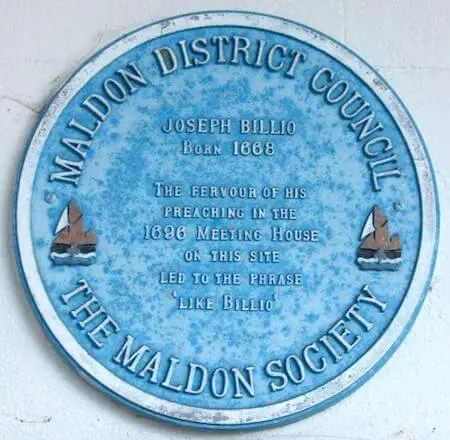An extreme standard of comparison; for example, “It rained like billy-o; we were all soaked through.”.
Like billy-o
What's the meaning of the phrase 'Like billy-o'?
What's the origin of the phrase 'Like billy-o'?
There isn’t a clear-cut explanation of this phrase’s origin. As it involves a common name, it is easy to come up with eponymous suggestions; for example, the 19th century steam locomotive the Puffing Billy.
Alternatively, the derivation is said to be from Joseph Billio, the zealous 17th/18th century Puritan preacher. Billio preached at the United Reformed Church in Market Hill, Maldon, Essex, in and around 1696. He was an enthusiastic ‘hellfire and damnation’ preacher and, given his name and reputation, ought to be a serious contender as the source of the phrase. They are certainly convinced in Maldon, and it must be true – they have a plaque to prove it.
Regrettably, that isn’t the source of the expression. It didn’t become common until long after Billio’s death and disappearance into obscurity (had you heard of him before?) and doesn’t appear in print for almost 200 years after Billio died.
The earliest printed record of the phrase in print is in the US newspaper The Fort Wayne Daily Gazette, March 1882:
“He lay on his side for about two hours, roaring like billy-hoo with the pain, as weak as a mouse.”
The actual ‘Billy-oh’ variant is first found in the UK newspaper The North-Eastern Daily Gazette, August 1885:
It’s my umbrella I’ll be lavin’ at home and shure it’ll rain like billy-oh!
Around the same time, a similar phrase emerged in the USA. In the North Dakota newspaper The Bismarck Tribune, September 1883, there’s a piece of what Mel Brooks would have called “authentic frontier gibberish”, under the title An Old Frontiersman Talks:
“You say Ol Grant was ‘yar with the gang
And the capital’s one hoo-doo
And the people cheered him like billy-be dang
Why, pardner, it can’t be true!”
This latter example appears to be a version of ‘Billy-be damned’, which had been recorded earlier, in 1849, in the Gold Rush Diary:
“Theodor looked as big as billy-be damned”
The Billy in question is this phrase isn’t the Reverend Billio but his arch enemy, the Devil.
The citations above are minced oaths, that is, euphemistic phrases that endeavour to avoid speaking the name of religious figures.
1849 sees the first use in the USA (and possibly anywhere) of the name billy-goat to denote a male goat. The term ‘billy-be damned’ indicated the Devil, following the imagery that pictured Satan as a monster in goat’s form.
The history of “Like billy – o” in printed materials
Trend of like billy – o in printed material over time
Related phrases and meanings
Browse more Phrases
About the Author

Phrases & Meanings
A-Z
A B C D E F G H I J K L M N O P Q R S T UV W XYZ
Categories
American Animals Australian Bible Body Colour Conflict Death Devil Dogs Emotions Euphemism Family Fashion Food French Horses ‘Jack’ Luck Money Military Music Names Nature Nautical Numbers Politics Religion Shakespeare Stupidity Entertainment Weather Women Work
How did we do?
Have you spotted something that needs updated on this page? We review all feedback we receive to ensure that we provide the most accurate and up to date information on phrases.
